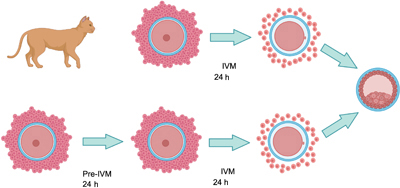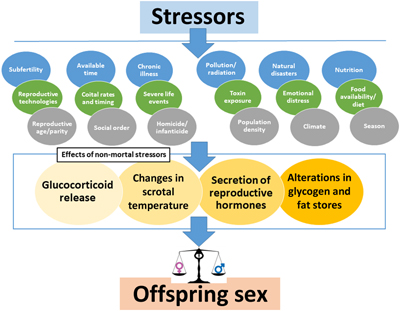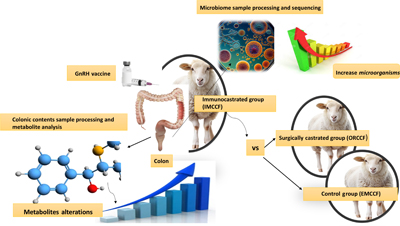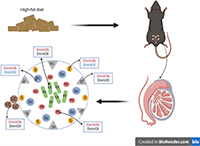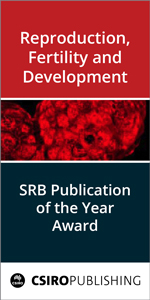Cat oocytes exhibit reduced competence when matured in vitro as compared to those matured within the ovarian environment. We sought to optimize a culture media that would increase developmental rates of immature oocytes through the use of an additional preliminary maturation step. While none of the additives chosen improved oocyte competence, we demonstrated the ability to hold oocytes for 24 h without a reduction in competence, an important finding for saving genetic material from endangered felids. Image by Shelley Sandmaier using BioRender.
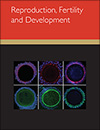
Reproduction, Fertility and Development
Volume 37 Number 10 2025
This review explores how hormones may influence the sex of mammalian offspring. Researchers examined how natural hormones and hormonal treatments around fertilization and during early pregnancy could affect sex ratios. Although hormonal manipulations offer a potentially sustainable way to influence offspring sex, they remain less reliable than currently used methods such as sperm sorting or embryo selection. Image by P. Bartlewski.
This study explores the impact of gonadotrophin-releasing hormone (GnRH) immunocastration on colonic microbiota and metabolites in male Xizang sheep. GnRH immunocastration effectively reduced testosterone levels, influenced microbial composition by increasing Bacteroidetes and beneficial genera like Bacteroides, and altered key metabolites such as methyl stearate and bile acids. These findings highlight GnRH immunocastration as a humane alternative to surgical castration, with improves animal welfare, nutrient absorption, and metabolic efficiency. Image by Shehr Bano Mustafa.
Assisted reproductive technologies like artificial insemination help address equine infertility, but selecting high-quality sperm beforehand can further boost fertility rates. Traditional methods like centrifugation may damage sperm DNA, whereas newer techniques – microfluidics (using tiny fluid channels to filter healthy sperm) and electrophoresis (sorting sperm by electric charge) – offer gentler alternatives. Innovations like VetMotl™ and Felix™ enhance sperm selection, improving pregnancy outcomes. While cost of these devices remains a challenge, ongoing research could make these advancements more accessible for equine breeding. Illustration by Ashlee Medica.
This article belongs to the collection: Frontiers in Reproduction Science – Rising Stars at the Society for Reproductive Biology 2024.
RD25045 Abstract | RD25045 Full Text | RD25045PDF (308 KB) Open Access Article
Obesity is a major health problem that can affect many parts of the body, including the reproductive system. This study examined how a high-fat diet can affect proteins potentially responsible for sperm production in mice. It was found that this diet led to changes in proteins called DNA methyltransferases, which can affect how other genes function through a process known as epigenetics. This suggests that obesity may contribute to male infertility by altering the epigenetic processes involved in sperm development. Image by authors using Biorender.com.



